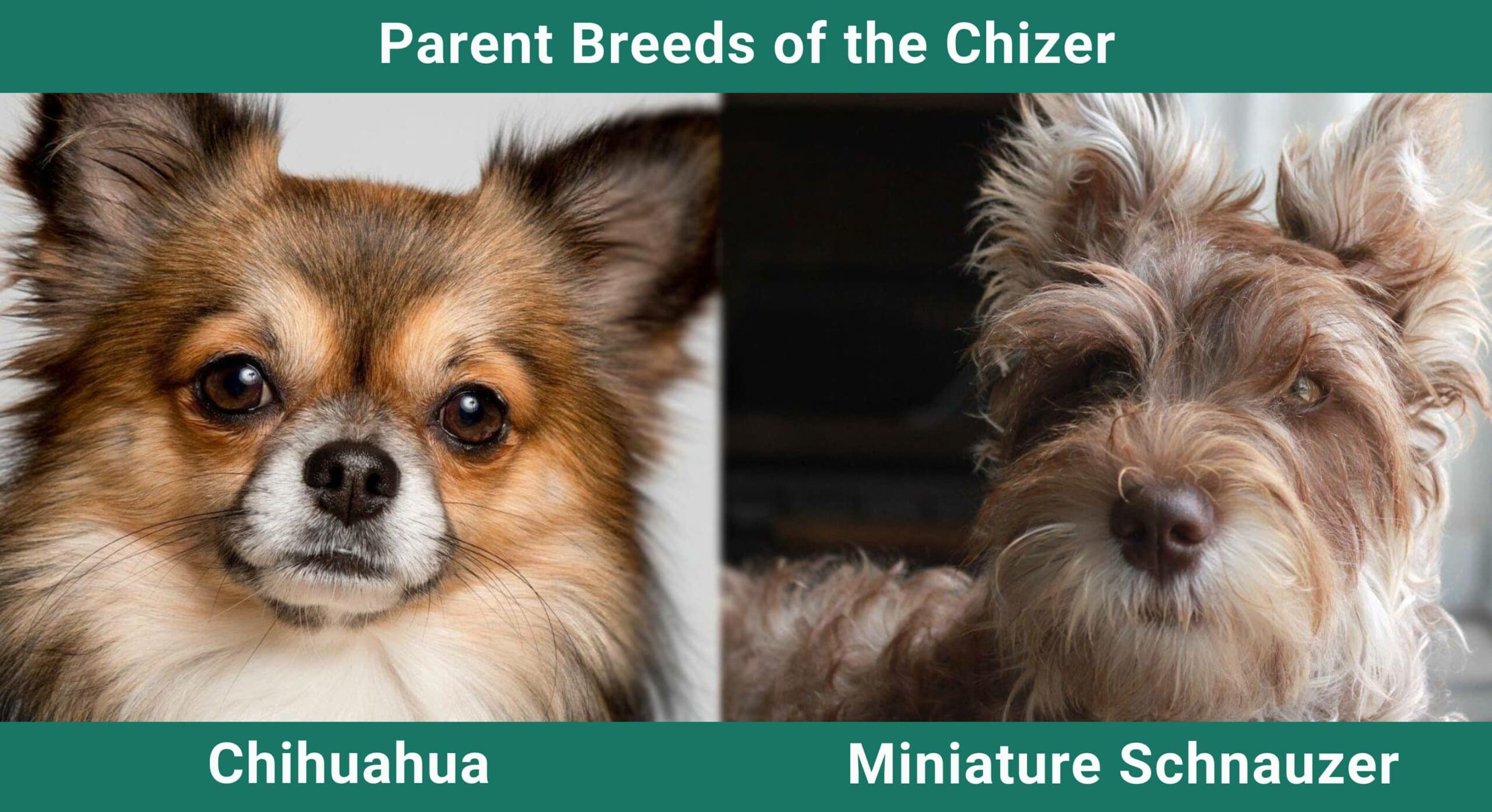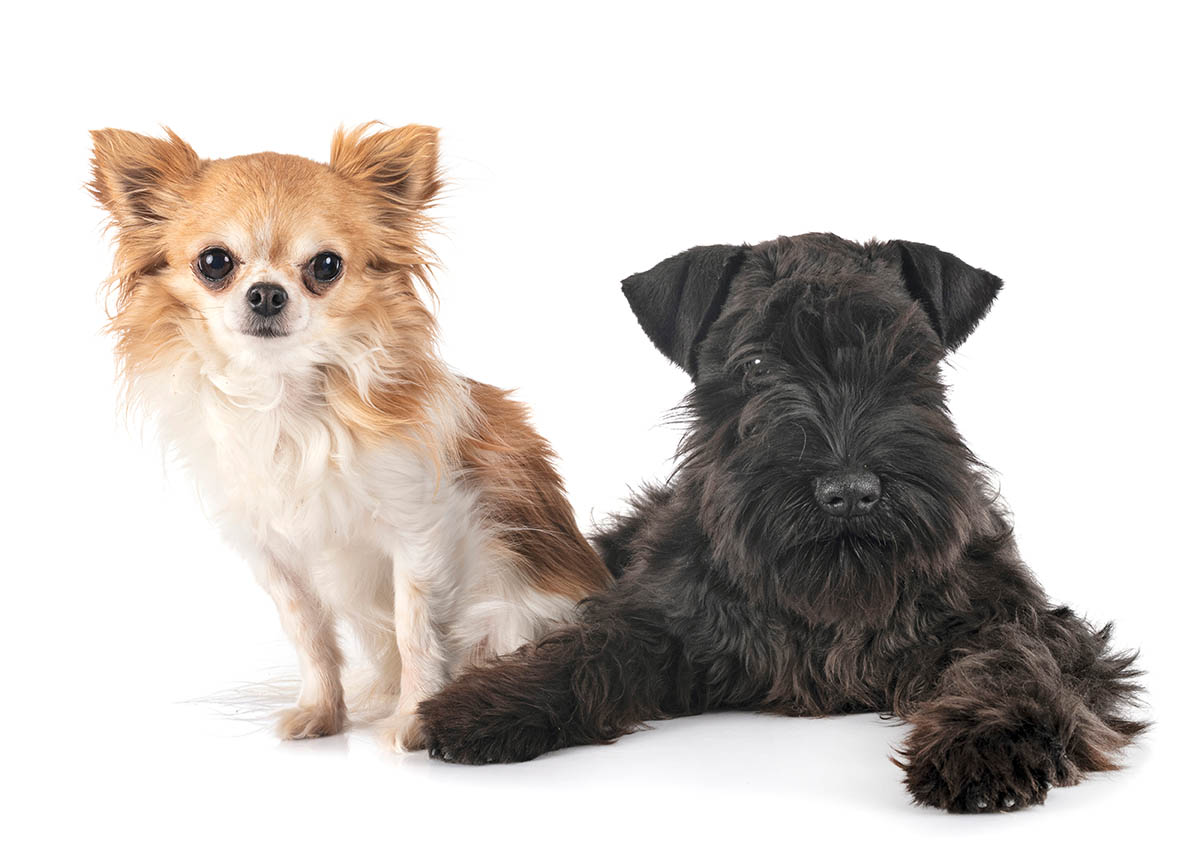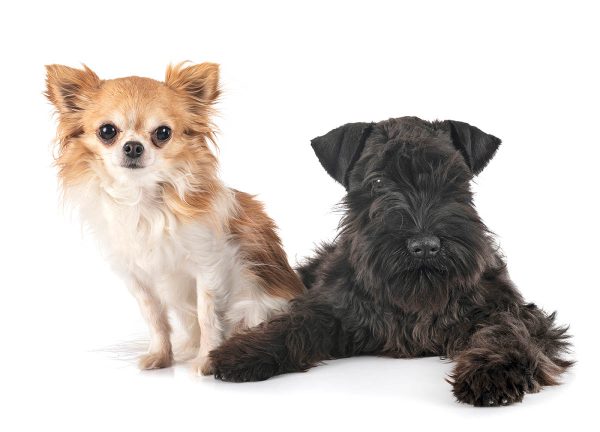Click Below to Skip Ahead
The Chizer is a cross of a Chihuahua and a Miniature Schnauzer. These little dogs are very intelligent and energetic. Like their parents, Chizers have a reputation for being somewhat stubborn and difficult to train.
Breed Overview
Height:
6–14 inches
Weight:
4–15 pounds
Lifespan:
12–15 years
Colors:
Black, brown, white, tan, cream, golden
Suitable for:
Single people, older couples, families with older children
Temperament:
Energetic, playful, intelligent, alert, aggressive, shy, loyal
They make good pets for single people, older couples, or families who don’t have young children. While Chizers are sweet and affectionate towards older family members, young children can scare them and cause them to act out.
Keep reading to learn more about whether a Chizer is right for you.
Chizer Puppies
Chizer puppies from a reputable breeder can be somewhat affordable. The costs are influenced by the breeder’s reputation, the pedigree of the puppy’s parents, and the location of the breeder. You will need to do your homework on the breeder and ask to see the puppy’s parents’ health records. These dogs can be prone to some serious health problems.
You may also stumble across the energetic Chizer in a shelter. You’ll save money by adopting rather than purchasing a puppy from a breeder. Older dogs are also more likely to have developed personalities, making it easier to determine if they’ll be a good fit for your family and situation.

Temperament & Intelligence of the Chizer
Chizers are very smart dogs, but they can be stubborn. They are also prone to nervousness and aggression. It is very important that these dogs live in the right kind of home for their safety and happiness.
Are These Dogs Good for Families?
Chizers are not great dogs for families, at least not for families with small children. The Chizer is prone to aggression and does not generally like young kids. They might be fine in a home with respectful, older children. Chizers can get jealous and require plenty of attention. They get very attached to their people and will thrive with an attentive single person or a devoted couple.
Chizers also don’t usually like strangers. They will bark at and even bite them if they feel threatened. This is another reason early socialization is a must with Chizers. Training and socializing can help your Chizer overcome its shyness and tamp down its aggressive tendencies.
Does This Breed Get Along With Other Pets?
Chizers can get along with other pets if they are socialized from an early age. However, their tendency to be aggressive and nippy might not be able to be completely eliminated, even with training. It is best that they are the only pet in your household.
Things to Know When Owning a Chizer:
Before bringing any pet into your home, you’ll need to do your homework. Every dog has special food, exercise, training, grooming, and health considerations. The Chizer requires the right person or small family to thrive. Meeting their other needs will help make your dog’s life happy and healthy.
Food & Diet Requirements
Chizers are not very large, thus they don’t require a lot of food. In general, about 1 cup of high-quality food formulated for small dogs should be sufficient for a Chizer.
These dogs are prone to stomach problems so be careful not to overfeed them. Dividing their food into two smaller meals is recommended. Some Chizers develop kidney problems and may require a low-phosphorus diet later in life.
Exercise
The Chizer is an active and energetic dog. They will need about an hour of exercise every day. Two long walks and a few other play sessions will help burn off their energy.
If they are stressed or bored, Chizers are very prone to chewing and will gnaw on anything they can find. Make sure your dog gets plenty of exercise to protect your home and possessions from their teeth.
Training
Even though they are really intelligent, Chizers are notoriously difficult to train. They get their stubborn streak from their Chihuahua parentage. Because of this, it is imperative that they are socialized from a young age and receive professional training if needed.
You’ll regret not training this spunky dog when it is young as this breed is known for acting out if they aren’t properly trained. Training can also help curtail some of their aggression.
Grooming ✂️
Chizers are relatively low-maintenance when it comes to grooming.
Depending on their coat, your Chizer will be a low to moderate shedder. They should always be brushed several times per week. You may also need to trim the hair around their eyes, nose, and ears if it gets too long. You should check their ears frequently for any signs of infection.
You’ll need to clip their nails about once per month. Finally, you should be diligent about regularly brushing your Chizer’s teeth to prevent dental problems.
Health and Conditions
Chizers are prone to a few serious health conditions and some less serious problems. The best way to keep your dog healthy is to make sure they are not overeating and are getting plenty of exercise. Regular veterinary check-ups can help catch problems early.
- Cataracts: Dogs can suffer from degenerative eye diseases, just like people.
- Skin Diseases: Some Chizers have sensitive skin and are prone to infections or itching. Keeping their coat groomed and their skin clean will help prevent excessive itching or infections.
- Arthritis: Excess weight can put more pressure on your dog’s joints as they age. Helping your dog maintain a healthy weight can lessen the likelihood that they will develop arthritis as they get older.
- Von Willebrand’s Disease: This is an inherited blood-clotting disease that is caused by the lack of a protein that helps blood clot. Treatment can require avoiding certain medications to blood transfusions in more serious cases.
- Diabetes: Diabetes in dogs is often caused by the animal being overweight. Miniature Schnauzers are among the dog breeds most prone to diabetes so it’s important to keep your Chizer at a healthy weight.
- Kidney and Liver Problems: Some dogs struggle to eliminate phosphorus, especially those with kidney problems. Diabetes can exacerbate liver problems in your dog. Both kidney and liver diseases can be fatal if not treated.
Male vs Female
There are no discernable differences between male and female Chizers. Both tend to fall into the same size ranges and have similar temperaments. Genetic health conditions are also equally distributed between the sexes.
3 Little-Known Facts About the Chizer
1. Chizers can look like either of their parents.
Chizers can strongly resemble either of their parents. This is why there is such a big range in size and weight possibilities for these dogs. Their coats can be short or medium, wiry or silky.
2. Another name for the Chizer is the Schnauchi.
Mixed breed dogs often have fun and interesting names, and the Schnauchi is definitely one of them!
3. Both Chihuahuas and Miniature Schnauzers have long histories.
Although the Chizer wasn’t recognized as a breed until 2009, both of its parents have been around for centuries. Chihuahuas can be traced back to the 9th century, while Miniature Schnauzers first appeared in the 14th century.
- Another interesting read: Bowzer (Basset Hound & Miniature Schnauzer Mix)
Final Thoughts
Chizers can be challenging dogs to own if they aren’t in the right family situation. However, with the right person or couple, they make loving, loyal pets. They just require a little more work than some other breeds. Proper training and socialization are the keys to a successful experience with a Chizer.
Monitoring their weight and making sure they get plenty of exercise can help stave off some of the diseases this breed is prone to. This will also protect your home and belongings from destruction.
If you have the time and energy to devote to the care of a Chizer, you’ll be rewarded with an affectionate and adorable companion.
Featured Image Credit: cynoclub, Shutterstock









